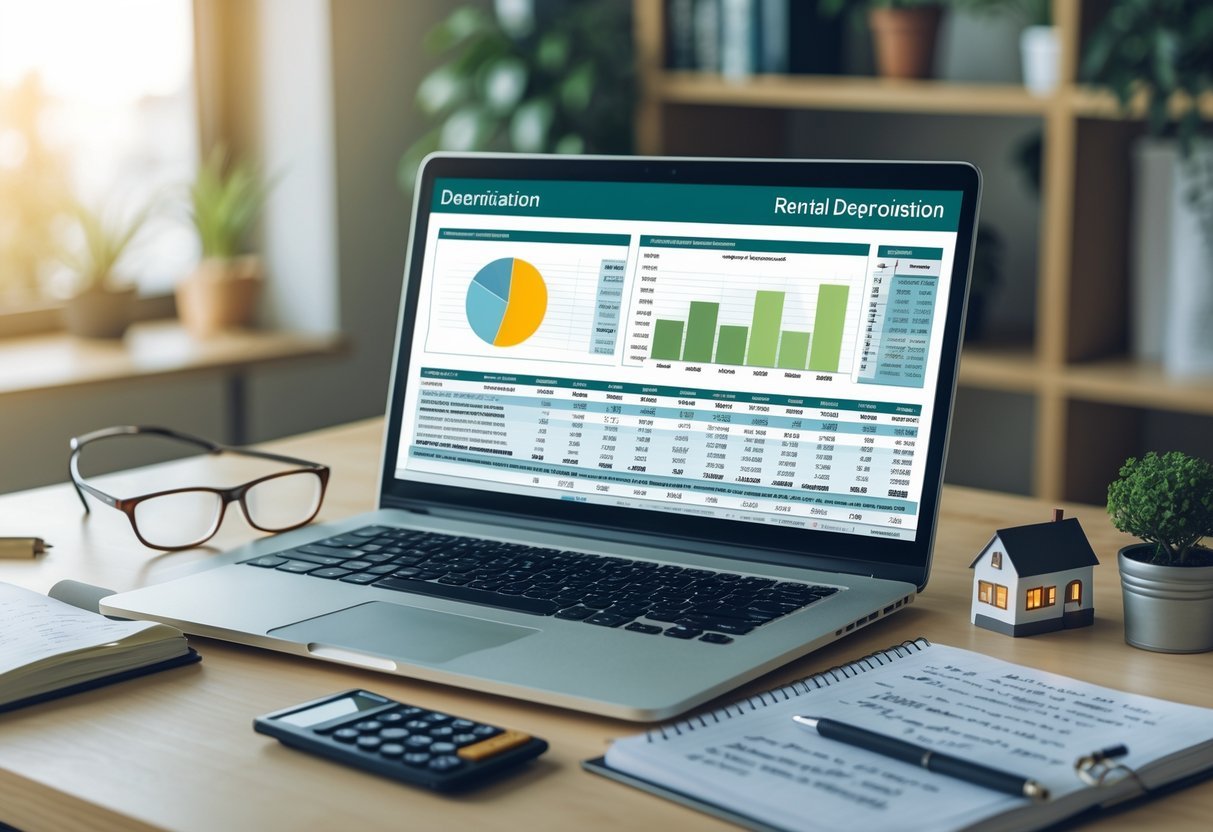Owning a rental property can lead to valuable tax savings if you understand how depreciation works. You can calculate your annual depreciation deduction by dividing your property’s cost basis by its IRS-defined useful life, giving you a straightforward method to reduce your taxable rental income. This not only impacts what you owe the IRS, but also helps you manage your cash flow year to year.
Learning to calculate depreciation correctly means you’ll stay compliant, maximize allowable deductions, and avoid common mistakes that lead to IRS scrutiny. You don’t need to be a tax expert—just follow a few essential steps to get your figures right and keep your paperwork in order.
Key Takeaways
- Learn the basics of rental property depreciation and why it matters.
- Get a simple process for calculating your annual deduction.
- Understand tax reporting requirements to stay compliant.
Essential Steps to Calculate Depreciation on Rental Property
Depreciation allows you to recover the costs of purchasing and improving your residential rental property over its useful life. To maximize your allowable deductions, you need to correctly determine the cost basis, value allocation, method, and expense calculation.
Determine the Cost Basis
The cost basis is the starting point for your depreciation calculation. Begin with the purchase price of the property, but remember this is not the only item included. Add associated costs such as legal fees, title insurance, recording fees, transfer taxes, and other closing costs directly related to acquiring the property.
If you paid settlement fees when you purchased the property, include these as well. Don’t include items like fire insurance premiums or rent paid before closing. Your finalized number should accurately reflect the amount you invested in acquiring the asset, forming the basis for future depreciation.
Allocate Value Between Land and Building
Only the building portion of your property is depreciable, not the land. To allocate value, find the fair market value or use the assessed values for both land and improvements as stated on property tax records. Calculate the percentage of the total value that is attributable to the building and apply that percentage to your cost basis.
If your apartment or investment property was acquired with other assets (such as appliances), allocate value to each based on their relative worth. This allocation ensures you only depreciate the portion applicable to the structure itself, as land remains undepreciable due to it not wearing out, decaying, or becoming obsolete over time.
Select the Depreciation Method
The IRS requires the use of the Modified Accelerated Cost Recovery System (MACRS) for most residential rental properties placed in service after 1986. Under MACRS, residential rental property uses a recovery period of 27.5 years, while nonresidential real property uses 39 or 40 years.
Within MACRS, the General Depreciation System (GDS) is most common. If your property has a shorter or longer useful life due to specific conditions, or if it qualifies for other schedules, the Alternative Depreciation System (ADS) may be required. Using the appropriate method ensures compliance and optimizes your allowable annual deduction.
Calculate Depreciation Expense
To calculate your annual depreciation deduction, use the following formula:
Depreciation Expense = (Allocated Building Basis) ÷ (Recovery Period in Years)
For example, if your building’s allocated cost basis is $220,000 and the recovery period is 27.5 years, your annual depreciation deduction would be about $8,000. Start your schedule when the property is placed in service, and continue until you have recovered your cost or the property is disposed.
Depreciation schedules, such as those from the IRS, guide deductions each year. For more details and calculation steps, refer to the IRS guide for residential rental property depreciation. This process helps offset rental income and reflects normal wear and tear as the asset ages.
Tax Considerations and Reporting for Depreciation
Depreciation can significantly lower your rental income tax bill by allowing you to deduct a portion of your property value every year. Knowing how to report depreciation correctly, plan for potential recapture taxes, and maximize your tax breaks is essential for getting the most savings and staying compliant.
Reporting Depreciation on Tax Forms
You must report depreciation each year as part of your annual return. Generally, you use IRS Form 4562 to determine and claim your depreciation deduction for rental property. This form requires you to list each property, the placed-in-service date, cost, and the amount of depreciation for the year.
After calculating depreciation, transfer the deductible amount to Schedule E (Supplemental Income and Loss), which is attached to your Form 1040. Schedule E is where you report your rental income, expenses, and net income. Accurately subtract your annual depreciation from your rental income to reflect your taxable income for the year.
You may find it helpful to consult IRS Publication 527 for detailed rules on residential rental property depreciation. A professional accountant can also help ensure you complete these forms correctly.
Depreciation Recapture and Sale of Property
When you sell a rental property, any past depreciation deductions reduce your property’s adjusted basis, affecting your net gain or loss. The IRS requires you to pay recapture tax on the portion of the gain equal to your total depreciation deductions, taxed at a special 25% rate—not the overall capital gains tax rate.
For example, if you depreciated $50,000 over several years, up to that amount of your profit upon sale is subject to this recapture tax. The rest of your gain (if any) may be subject to capital gains tax rates.
Some investors may defer recapture by doing a 1031 exchange, swapping one rental property for another, allowing deferral of tax on both depreciation recapture and any net gain. However, rules for 1031 exchanges are strict, so it’s best to work with an experienced CPA.
Maximizing Tax Benefits and Avoiding Common Pitfalls
To maximize your depreciation tax benefit:
- Make sure you allocate the property’s original purchase price accurately between land (not depreciable) and building (depreciable), as advised by TurboTax.
- Begin depreciation as soon as the property is available for rent, regardless of tenant occupancy.
- Keep detailed records, including settlement statements, improvements, and adjustments to your adjusted basis.
Common mistakes to avoid include forgetting to depreciate, misallocating costs, or incorrectly entering information on tax forms. Not claiming allowable depreciation can reduce your tax basis and later increase your recapture tax.
Real estate investors should consult a qualified accountant who understands rental property rules to take full advantage of deductions. Proper reporting and planning can result in significant long-term savings and fewer surprises at tax time.
Frequently Asked Questions
Knowing the rules for rental property depreciation helps you get the most from your annual deductions. It’s important to use the correct method, life span, and cost basis to avoid errors and issues with the IRS.
What is the useful life span to depreciate residential rental property?
Residential rental property is depreciated over a period of 27.5 years under the Modified Accelerated Cost Recovery System (MACRS) in the United States. This recovery period applies specifically to the building, not the land. For more details, see the IRS guidelines.
How do you determine the cost basis for depreciating a rental unit?
Your cost basis generally starts with what you paid to purchase the property, including closing costs, legal fees, transfer taxes, and recording fees. Subtract the value of the land, as land is not depreciable. The remaining basis applies to the building and is then used for calculating depreciation. More information can be found at Quicken Loans.
Can depreciation be claimed on rental property in any tax year?
You can claim depreciation for any tax year in which the rental property is placed in service and being used for rental purposes. Depreciation begins when the property is available for rent, not necessarily when it is actually rented. It ends either when you have fully recovered your cost basis or you stop using the property for rental purposes, whichever comes first.
What are the limitations or income thresholds for depreciating rental real estate?
There is no cap on the dollar amount of depreciation you can deduct each year, but rental real estate losses may be subject to passive activity loss limitations. These IRS rules restrict loss deductions depending on your income and level of participation in managing the property. Generally, some or all excess losses may be carried forward to future years if your income is above set thresholds.
Is recapturing depreciation mandatory upon the sale of a rental property?
Yes, when you sell a rental property, the IRS requires you to recapture the depreciation you claimed or could have claimed. The recaptured amount is taxed as ordinary income, up to certain limits, rather than as a capital gain. This applies even if you did not actually claim any depreciation during ownership. However, utilizing a 1031 exchange can defer payment of capital gains tax and depreciation recapture tax.
How does one calculate depreciation for property improvements or renovations?
Any capital improvement or renovation that adds value, prolongs the property’s life, or adapts it for a different use should be added to your cost basis. These improvements are depreciated over their own recovery periods, usually 27.5 years for residential buildings. Start depreciating improvements in the year they are placed in service. Read more at Stessa’s guide.




